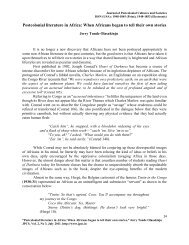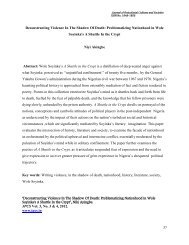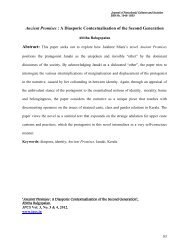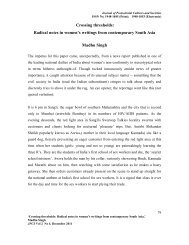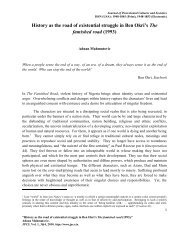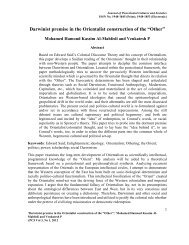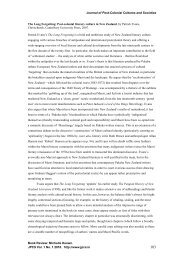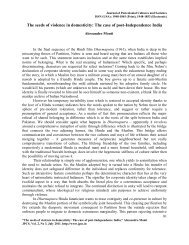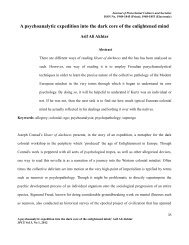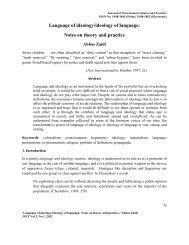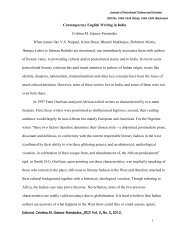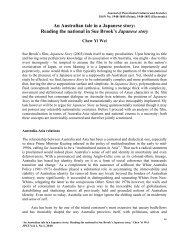'Complicity and resistance: Women in Arundhati Roy's The - JPCS
'Complicity and resistance: Women in Arundhati Roy's The - JPCS
'Complicity and resistance: Women in Arundhati Roy's The - JPCS
You also want an ePaper? Increase the reach of your titles
YUMPU automatically turns print PDFs into web optimized ePapers that Google loves.
Journal of Postcolonial Cultures <strong>and</strong> Societies<br />
ISSN No. 1948-1845 (Pr<strong>in</strong>t); 1948-1853 (Electronic)<br />
Ammu, crav<strong>in</strong>g to take control of her life that is so much suppressed by a social order, is<br />
faced aga<strong>in</strong>st a system where her “Marxist” brother Chacko exploits the poor women<br />
labourers <strong>in</strong> his factory, both f<strong>in</strong>ancially <strong>and</strong> sexually, <strong>and</strong> goes unchecked. She sees<br />
characters like Mammachi, be<strong>in</strong>g appropriated by patriarchy <strong>and</strong> be asphyxiated <strong>and</strong><br />
distorted by it. She sees Velutha be<strong>in</strong>g accused of the accidental drown<strong>in</strong>g of Sophie Mol.<br />
Ammu‟s father is <strong>in</strong>credulous of the fact that her Bengali H<strong>in</strong>du husb<strong>and</strong> wanted to<br />
prostitute her <strong>in</strong> order to please his white boss. <strong>The</strong> colonial rulers‟ authority is<br />
challenged by a subaltern woman <strong>in</strong> the novel who is economically <strong>and</strong> socially<br />
marg<strong>in</strong>alized. Smothered by social <strong>in</strong>justice, Ammu rebels aga<strong>in</strong>st the very social norms<br />
that constitute the Syrian Christian community <strong>in</strong> Kerala. This rebellion is an act of<br />
<strong>resistance</strong> aga<strong>in</strong>st the very foundations of this society. Her most significant act of<br />
becom<strong>in</strong>g sexually <strong>in</strong>volved with the “Untouchable”, lower class Velutha, cannot be<br />
taken at its face value as an act of sexual transgression only.<br />
This is an act of <strong>resistance</strong> aimed at br<strong>in</strong>g<strong>in</strong>g about change <strong>in</strong> <strong>and</strong> around her. That is why<br />
she goes to the police station <strong>and</strong> argues aga<strong>in</strong>st the detention of this lower caste, lower<br />
class subaltern, deny<strong>in</strong>g supposed “womanly” qualities typical of an Indian woman. This<br />
prefigures Roy‟s proffered post-colonial Indian woman, who has rega<strong>in</strong>ed her right to be<br />
an “Indian woman”, with the end of colonialism. Amitabh Roy‟s words thus do have<br />
strong evidential basis: “Ammu, on the other h<strong>and</strong>, is the rebel who represents the<br />
defiance of the present [neo-colonial] state of society from educated[though marg<strong>in</strong>alized<br />
<strong>and</strong> proleterianized], passionate <strong>and</strong> th<strong>in</strong>k<strong>in</strong>g women. She st<strong>and</strong>s for those women who<br />
are aspir<strong>in</strong>g for freedom <strong>and</strong> equality. This section of women is challeng<strong>in</strong>g traditional<br />
[pre-colonial] ideas <strong>and</strong> conventions. <strong>The</strong> hopes for the [post-colonial] future lie with this<br />
section only.”(2005, p.77-78) In short Ammu as a subaltern/woman resists oppressive<br />
<strong>and</strong> repressive social <strong>and</strong> political structures. She does not succeed <strong>in</strong> br<strong>in</strong>g<strong>in</strong>g about any<br />
tangible change but puts up a brave fight for realiz<strong>in</strong>g her dreams. Although she may not<br />
consciously have worked for other subalterns, her actions contribute to the emancipation<br />
of different k<strong>in</strong>ds of subalterns <strong>and</strong> there lies her exceptionality.<br />
‘Complicity <strong>and</strong> <strong>resistance</strong>: <strong>Women</strong> <strong>in</strong> <strong>Arundhati</strong> Roy’s <strong>The</strong> God of Small Th<strong>in</strong>gs,’ Golam Gaus Al-<br />
Quaderi <strong>and</strong> Muhammad Saiful Islam<br />
<strong>JPCS</strong> Vol 2 No 4, December 2011<br />
65



